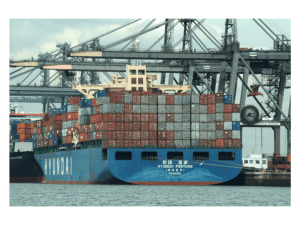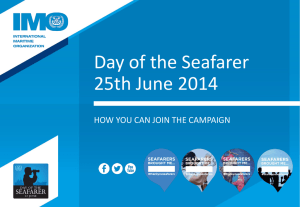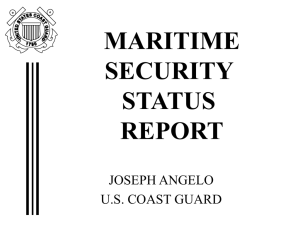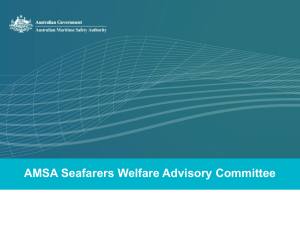DRAFT Comments of International Organization of Masters, Mates
advertisement
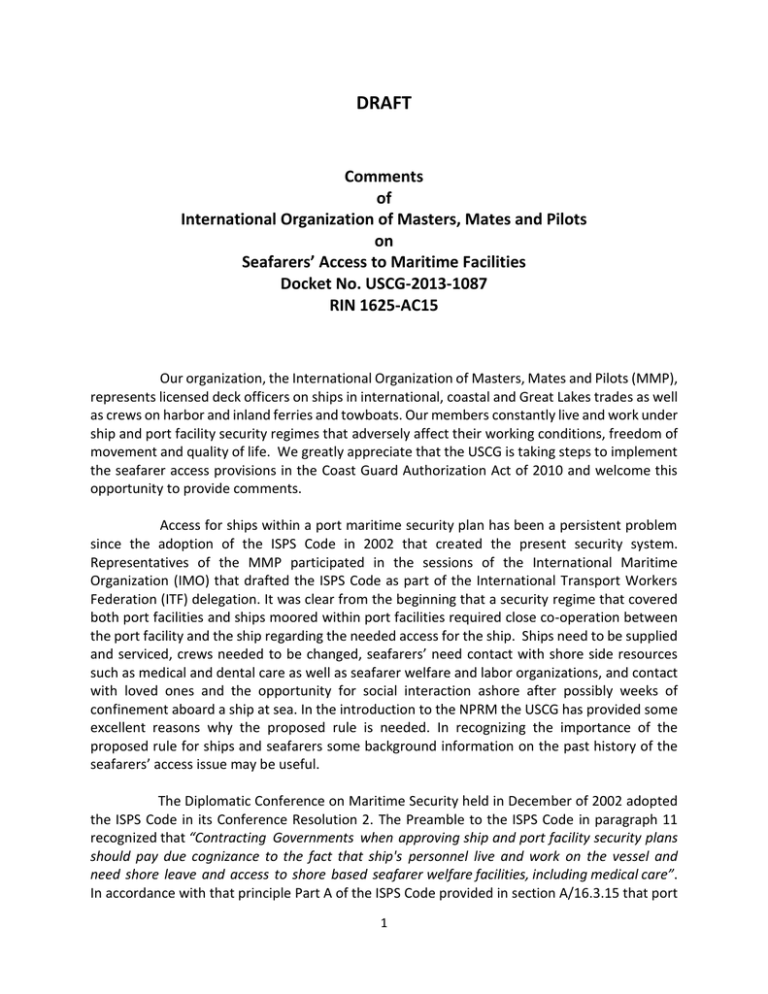
DRAFT Comments of International Organization of Masters, Mates and Pilots on Seafarers’ Access to Maritime Facilities Docket No. USCG-2013-1087 RIN 1625-AC15 Our organization, the International Organization of Masters, Mates and Pilots (MMP), represents licensed deck officers on ships in international, coastal and Great Lakes trades as well as crews on harbor and inland ferries and towboats. Our members constantly live and work under ship and port facility security regimes that adversely affect their working conditions, freedom of movement and quality of life. We greatly appreciate that the USCG is taking steps to implement the seafarer access provisions in the Coast Guard Authorization Act of 2010 and welcome this opportunity to provide comments. Access for ships within a port maritime security plan has been a persistent problem since the adoption of the ISPS Code in 2002 that created the present security system. Representatives of the MMP participated in the sessions of the International Maritime Organization (IMO) that drafted the ISPS Code as part of the International Transport Workers Federation (ITF) delegation. It was clear from the beginning that a security regime that covered both port facilities and ships moored within port facilities required close co-operation between the port facility and the ship regarding the needed access for the ship. Ships need to be supplied and serviced, crews needed to be changed, seafarers’ need contact with shore side resources such as medical and dental care as well as seafarer welfare and labor organizations, and contact with loved ones and the opportunity for social interaction ashore after possibly weeks of confinement aboard a ship at sea. In the introduction to the NPRM the USCG has provided some excellent reasons why the proposed rule is needed. In recognizing the importance of the proposed rule for ships and seafarers some background information on the past history of the seafarers’ access issue may be useful. The Diplomatic Conference on Maritime Security held in December of 2002 adopted the ISPS Code in its Conference Resolution 2. The Preamble to the ISPS Code in paragraph 11 recognized that “Contracting Governments when approving ship and port facility security plans should pay due cognizance to the fact that ship's personnel live and work on the vessel and need shore leave and access to shore based seafarer welfare facilities, including medical care”. In accordance with that principle Part A of the ISPS Code provided in section A/16.3.15 that port 1 facility security plans shall address “procedures for facilitating shore leave for ship's personnel or personnel changes, as well as access of visitors to the ship including representatives of seafarers' welfare and labour organizations”. In addition, and of equal importance to seafarers, the same Diplomatic Conference also adopted Conference Resolution 11 that addresses shore leave for seafarers. It recognized that the shipping industry and the smooth transportation of goods that are essential to world trade is made possible by seafarers who work and live on ships involved in international trade. It noted that access to shore facilities and shore leave are vital elements of a seafarers’ general well-being and the FAL Convention established a general right for crew members to be entitled to shore leave while the ship on which they arrived is in port. It also noted that the generally accepted principles of international human rights also applied to seafarers and that given the global nature of the shipping industry, seafarers need special protection. It urged Governments to take the human element, the need to afford special protection to seafarers and the critical importance of shore leave into account when implementing the provisions of the ISPS Code. As a party to the SOLAS Convention the U.S. has a treaty obligation to conform its national laws and regulations to the provisions in the ISPS Code. In conforming ISPS Code section A/16.3.15 that requires facilitation of seafarers’ access into national regulations the U.S. substituted the word “coordination” for the word “facilitation” of shore leave in the relevant regulation (33 CFR §105.200 (b)(9)). This changed the meaning and intent of the ISPS Code and created a non-conformity that port facilities could exploit to avoid their obligations to seafarers and ships in a security regime. As acknowledged in the NPRM some port facilities have taken the position that if they deny access there is nothing to coordinate, or they make shore leave impractical by placing extreme limitations on escort availability, charging exorbitant fees, requiring excessive paperwork or preapproval, or other actions that fall outside any reasonable definition of the required facilitation of shore leave and access. The denial of shore leave and access to ships in the U.S. has severely damaged the reputation of the U.S. among the international maritime community as a nation that had a respect for human rights and its obligations under international law. In response, in 2004 the IMO addressed the issue of denial of shore leave and access to ships, primarily directed toward the U.S., in IMO circular MSC/Circ. 1112. It expressed concern that the emphasis on port facility security may result in the ship and seafarers being viewed as a potential threat to security rather than partners in the new security regime. It recognized there may be conflicts between security and human rights, as well as between security and the efficient movement of ships and cargoes in international trade that is essential to the global economy. It called for a proper balance between the needs of security, the protection of the human rights of seafarers and port workers, and the requirement to maintain the safety and working efficiency of the ship by allowing access to ship support services such as the taking on of stores, repair and maintenance of essential equipment, and other vital activities that are appropriately undertaken while moored at port facilities. 2 To address these concerns the IMO emphasized in the circular that section A/16.3.15 of the ISPS Code provides that a port facility security plan (PFSP) must contain procedures for facilitating shore leave, crew changes and access for visitors including representatives of seafarers’ welfare and labour organizations. And, that those provision should be construed as including shore-based ship support personnel and the taking onboard of ship’s stores. Despite the IMO directive that in approving PFSPs’ Contracting Governments must ensure that PFSPs’ address the access procedures the ISPS Code, the USCG did not do so and routinely approved PFSPs’ without provisions for access for seafarers and others. Due to the continuing problem with access to ships moored at port facilities the IMO once again considered the issue in 2010 and concluded that some Contracting Governments were not implementing the ISPS Code, Conference resolution 11 and the guidance in IMO circular MSC/Circ. 1112 appropriately and had not put in place effective measures to monitor port facility compliance with the international requirements regarding access to ships. The IMO amended and reissued circular MSC/Circ. 1112 as circular MSC.1/Circ. 1342 as a reminder to Contracting Governments (the U.S.) of their obligations under the SOLAS Convention in implementing the ISPS Code with provisions for seafarer access. As the USCG continued to approve PFSPs’ without provisions that complied with ISPS Code requirements on facilitation of access it became apparent they were reluctant to enforce the international requirements without a directive from Congress. That directive came in section 811 of the Coast Guard Authorization Act of 2010 that is the subject of this rulemaking. The Act in effect enables and directs the USCG to mandate by regulation the facilitation of access provisions in the ISPS Code. Shore leave and access to the ship is a major issue for not only seafarers, but for the entire maritime industry. It affects the ability of ships to be maintained, supplied with stores and bunkers, service equipment, change crews, and carry out tasks that can only be efficiently performed while a ship is moored at a port facility. With a global shortage of seafarers it affects the recruitment and retention of seafarers who are treated like potential criminals and terrorist rather than the professionals that the international maritime transportation system and the global economy is dependent upon. Our concern now is that given the long struggle to get to this point and the past history of the U.S. on this issue, as well as some port facilities parsing the language to avoid its obligations, that the language of the regulation be as precise and clear as possible on the required access provisions. The proposed language in the NPRM is generally excellent and we are pleased that action is finally being taken on this serious issue of fair treatment for seafarers. We have only one major concern and some observations. 1. The major concern is that under “Table 2- Cost Matrix” in the NPRM it indicates that the cost of providing access may be passed onto the vessel. If this is interpreted as passing it on as a specific discretionary charge to an individual ship it could be passed on to the seafarer by the ship owner as a charge against his wages. This would defeat the intent of the Congressional 3 Act that requires timely and cost free access for seafarers. Any costs of providing access by the facility should be recaptured in the general tariffs of the facility applicable to all ships and not as a specific discretionary charge against an individual ship. We would suggest that section 105.237 (e) be amended to read as follows: (e) No cost to individuals. The facility owner or operator must provide the access described in this section at no cost to the individual or as a charge to the individual ship to whom which such access is provided. 2. In the proposed text a factor to consider in determining the timeliness of access is “A facility’s safety and security procedures required by law.” While we agree with the explanation for the text in the NPRM discussion under “VI Regulatory Analyses”, we have concerns that standing alone in a regulation without the explanatory language it could open the door to denying timely access based on supposed safety or security concerns. The issue of alleged safety or security concerns has been a frequent basis for denying access in the past. We believe that specific safety or security concerns can be adequately addressed under the factor – “Any other factors specific to the vessel or facility that could affect access to and from the vessel”. 3. In the Executive Summary, C. Summary of Costs and Benefits, it is stated that 907 seafarers have been denied access on an annual basis. This is grossly under estimating the problem. MARAD data indicates that on an annual basis there are over 68,000 ship calls in international trade over 10,000 DWT at U.S. ports. With an average crew of 16 for ship of that size, this would involve over one million seafarers. In the NPRM, “IV Background”, the USCG believes that 90% of port facilities provide access. We seriously doubt the actual number is that high for full compliance, but even if true it would still leave 10% of the port facilities in noncompliance affecting over 100,000 seafarers on a national annual basis. This does not include numerous ships under 10,000 DWT in international trade or the US Army Corps of Engineers data that there are over 8,000 self-propelled dry cargo, tanker and towboats employed on inland waterways estimated to employ over 40,000 crew members calling at over 2,000 regulated maritime facilities on a regular basis. If the total international and inland sectors are taken into account it is difficult to quantify the actual number of seafarers affected but it undoubtedly runs into the 100’s of thousands. 4
